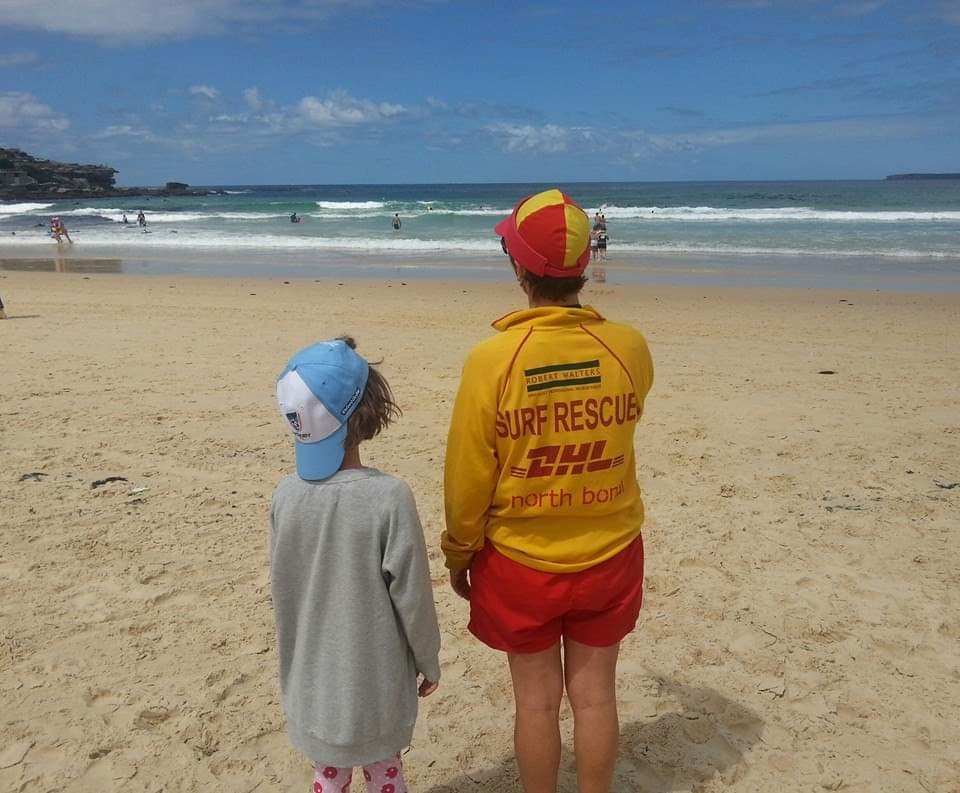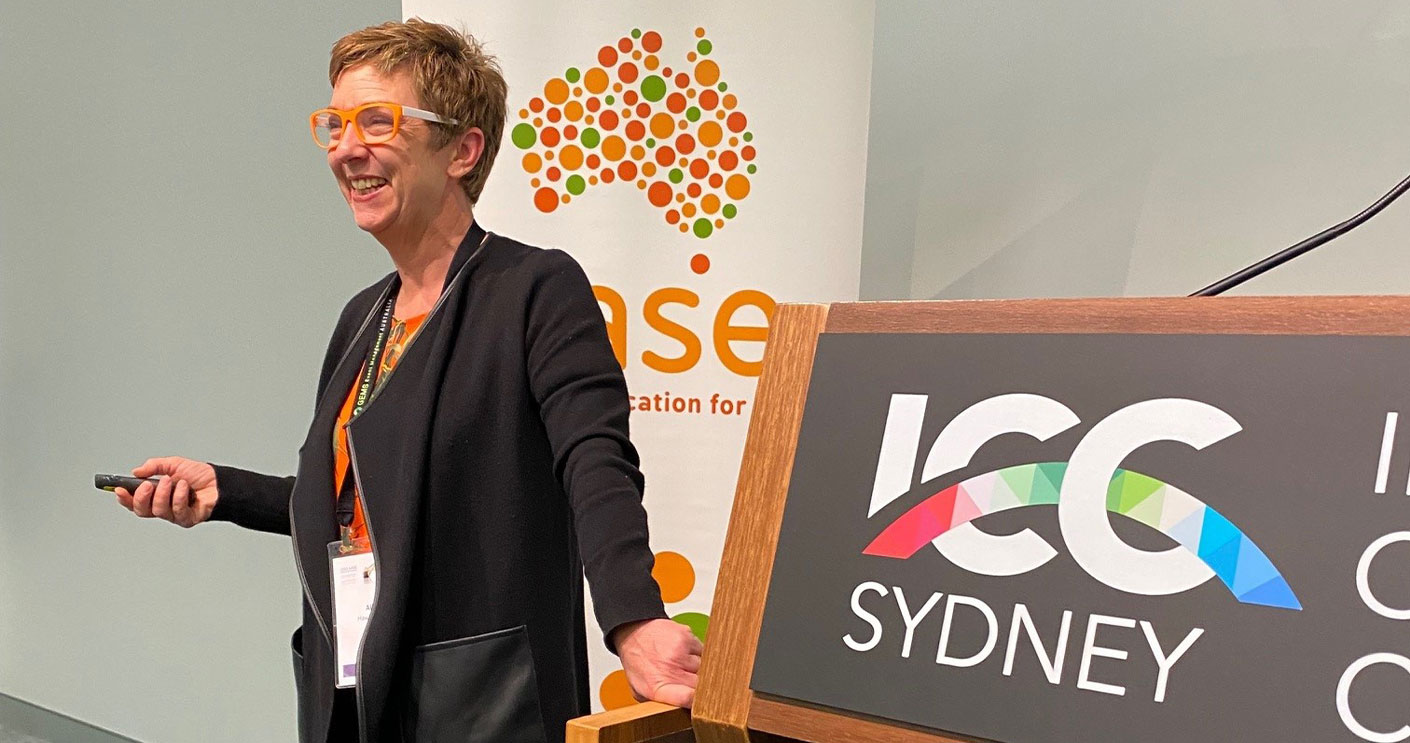Alison Hawkins-Bond is an educational studies lecturer for the School of Education’s Master of Disability Studies. She is President of the Educators of Deaf Students Association NSW (EDSA) and sits on the committee for the National Association of Australian Teachers of the Deaf (NAATD).
She started at Macquarie in 2017 following 30 years of teaching experience in the United Kingdom and Australia in early childhood, primary and secondary education, and special education (deafness, blindness, neurodiversity) using a range of communication modes.
Her current research focuses on the use of reflective practice to motivate professionals to continuously improve the ways they support children and people of all abilities and backgrounds to achieve in their personal and academic life.
1. Something you’d like staff to know about
In 2005 I led a team of amazing teachers and allied health professionals in the delivery of the first national videoconferencing service for children who are Deaf, hard of hearing, blind or have low vision, as well as their families and teachers. This group included children from remote Aboriginal communities in the Northern Territory who had to fly in by plane.
2. Something you feel proud of
I saved someone’s life. I was at dinner in a restaurant when I witnessed a man needing care, so I applied my lifesaving and first aid skills to resuscitate him. You never know when those years of training might be needed.
3. A person you admire at Macquarie, and why
Associate Professor Michael Cavanagh. His book was the first I had on reflective practice and within days of starting at Macquarie I found myself sitting next to him in a meeting. I immediately knew this was a place of great opportunity. He has continued to be generous with his time, sharing his insights and always asking thought-provoking questions that challenge my assumptions.
4. Something people usually ask you when they find out what you do for a living
Can you communicate using sign language?
Whilst I have qualifications in British Sign Language (BSL) and Australian Sign Language (Auslan), I am very grateful to Deaf people and Auslan interpreters for their patience when I communicate with them and mix up some of my BSL and Auslan signs.
As with any language you need to keep practicing, but the convenience of online Auslan classes has made it easier than ever to learn. With the introduction of the Auslan syllabus in New South Wales schools in 2023/24, I am optimistic that in the future, more people will learn the Auslan language and understand about Deaf culture regardless of their job.
5. Something you’ve read recently that has had an impact on you
I was surprised by a fact I read at the Clemenger BBDO exhibition on the theme of Creative Potential at the National Gallery of Victoria (NGV). Louis Braille lost his sight at three years old while playing with a tool from his father’s shed, then went on to use the same tool at age 15 to create an embossed system of dots and dashes now known as Unified English Braille (UEB). Based on the coding system used by the military to help soldiers read at night, his innovation has given thousands of people with blindness and severe vision impairment equitable access to information and inclusion in education, employment and society on the same basis as their sighted peers.
In recognition of the UN Convention on the Rights of Persons with Disabilities, it is fantastic that UEB Literacy and UEB Mathematics are now available free and online for anyone who wants to learn braille. This is another amazing example of how an event not only changed the life of young Louis, but also the lives of many of the 2.2 billion people with vision loss.
6. A favourite photo from your camera roll
Having fun with my family on the beach at North Bondi. Life is about balancing the time to do what you love and giving back by volunteering. It’s a great way to meet people from a diverse range of backgrounds.
Only last week at Hearing Australia’s 75th anniversary conference, I reconnected with a former North Bondi lifesaver Dr Naomi Malone whose lived experience of deafness lead to an exploration of deaf history for her PhD – ‘A constant struggle: A history of deaf education in New South Wales since World War II’. It is a very interesting read.

7. Something you’re trying to do differently in 2022
Be courageous and try new activities. As a result, I have returned to playing hockey after a 30-year break. Although my joints protested, I realised how much I loved it.
8. The International Day of People with Disability was Saturday 3 December. Why is it important to promote awareness of this day?
The International Day of People with Disability (IDPwD) is an opportunity to celebrate the diversity, contributions and achievements of people with disability, as well as promote inclusion and find ways to break down barriers.
9. The theme for IDPwD 2022 was ‘Transformative solutions for inclusive development: the role of innovation in fuelling an accessible and equitable world’. Can you explain what the theme meant to you?
There have been and continue to be many technological advances that have transformed the options available to meet people’s different access needs. For example, the cochlear implant, which provides access to spoken language for newborns to people over 90 years old; closed captions for TV, movies and online meetings for people who are Deaf/hard of hearing; tactile 3D maps to help people who are blind navigate; and a range of accessibility features on smart phones, tablets and computers. However, the solution for inclusion that has the most potential for creating an equitable world is people and their attitudes to disability.
10. What else do you want staff at Macquarie to know?
Each and every one of us can make a difference. It might start with ways to make iLearn content and course materials accessible in the early stages of development, rather than added on at the end. Reviewing Guidelines for Producing Clear Print or applying Universal Design for Learning (UDL) principals is a good place to begin.
Perhaps challenge yourself to review the learning environment you provide to see if it enables students to access and participate meaningfully in the learning opportunities made available. Or take some time to think about your beliefs or assumptions about people with a visible or invisible disability. There may be those who challenge your perception as they do not identify as having a disability, such as individuals who are part of the Deaf community and use Auslan and take pride in their culture. By considering our attitudes and behaviours we can all become changemakers for inclusion and seek to uphold the rights of all people.


 Back to homepage
Back to homepage
Comments
We encourage active and constructive debate through our comments section, but please remain respectful. Your first and last name will be published alongside your comment.
Comments will not be pre-moderated but any comments deemed to be offensive, obscene, intimidating, discriminatory or defamatory will be removed and further action may be taken where such conduct breaches University policy or standards. Please keep in mind that This Week is a public site and comments should not contain information that is confidential or commercial in confidence.